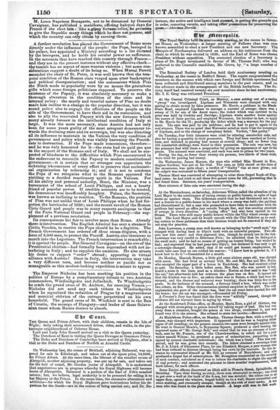A further revolution has placed the Government of Rome more
directly under the influence of the people: the Pope, besieged in his palace, has appointed a Ministry according to a list dictated by the besiegers, and he holds his secular power on sufferance. In the accounts that have reached this country through France— and they are in the present instance without any effective check— the tumult has an aspect of mere wanton violence ; but some con- siderations suggest a doubt of its being so. When Mastai Feretti amended the chair of St. Peter, it was well known that the tem- poral condition of the Roman state verged upon utter bankruptcy and political disorganization ; and the concessions which Pius the Ninth made to popularity were by no means the gratuitous gifts which some foreign politicians supposed. To preserve the existence of the Papacy, it was absolutely necessary to make a thorough alteration in the condition of the state and its internal policy : the manly and trustful nature of Pius no doubt made him incline to a change in the popular direction, but it was sound policy also to engage the affections of the people on the side of the GoVernment, to have their aid in its restoration, and also to ally the renovated Papacy with the new fortunes which many already foresaw in the intellectual condition of Italy at large. It was the more necessary, since Austria had not only been for some years guilty of the most arrogant demeanour to- wards the declining state and its sovereign, but was also directing all its influence to maintain in the Vatican the very condition of government and policy which was visibly hastening the Pontifi- cate to destruction. If the Pope made concessions, therefore— and he was duly honoured for it—the state had its quid pro quo in the support of the Romans and of Italy. We shall not be sus- pected of blindness to the difficulties which Pius encountered in the endeavour to reconcile the Papacy to modern constitutional government—it is certain that no stranger can appreciate the sickening irksomeness of every effort to preserve that ecclesiasti- cal organization by reforming it; and it is not to condemn the Pope if we recognize what to the Romans appeared the yielding to a decided reactionary spirit in the Vatican. For all his ability and personal audacity, Rossi, the Minister, was a bureaucrat of the school of Louis Philippe, and not a hearty friend of popular power. If credible accounts are to be trusted, his demeanour was insufferably haughty. Palma, the Secretary, was known as inclining to reaction. To the Romans, the position of Pins was not unlike that of Louis Philippe when he had for- gotten the barricades of 1830; and the recent revolt of the Roman Civic Guard and people was in many respects analogous to that of the Paris National Guard and people in February—the sup- plement of a previous revolution. Its consequences bid fair to involve more than Rome. Already there is intervention. The English Admiral has sent a steamer to Civita Vecchia, to receive the Pope should he be a fugitive. The French Government has ordered off three steam-frigates, with a force of 3,500 men, to protect the Pontiff. Austria also threatens to march into the Legations. The French intervention is remarkable ; it is against the people. But General Cavaignac—on the eve of the Presidential election—had formally been reproached with not in- terfering in Italy ; and be supplies the omission. He also attests his desire to support " order" abroad ; appearing in virtual alliance with Austria! Once in Italy, the intervention may take a very different turn, and become neither so pacific nor so manageable as this modest-looking expedition is meant to appear.


























 Previous page
Previous page